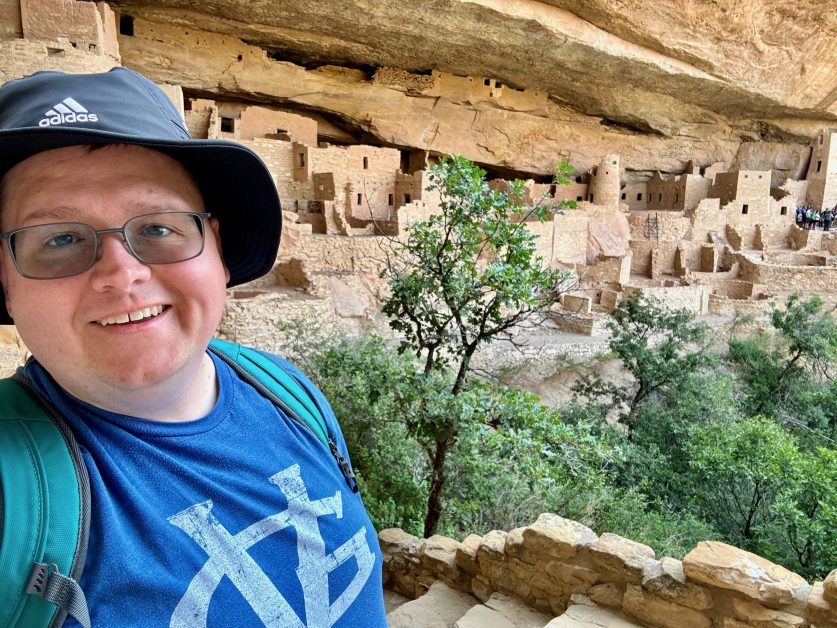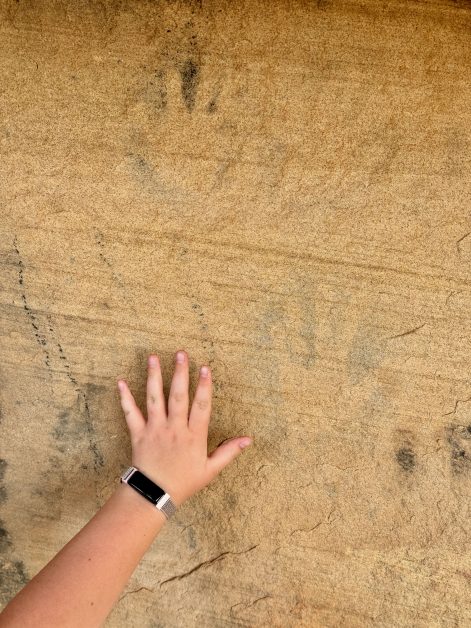

As my family and I continued our Colorado camping adventure, we found ourselves drawn to the ancient Pueblo dwellings scattered throughout the region. Sites like Cliff Palace in Mesa Verde and Painted Hand in the Four Corners region offered us a glimpse into the lives of the Ancestral Puebloans, whose ingenuity and resilience left an indelible mark on the landscape. These awe-inspiring structures, perched high on cliffs and nestled within canyons, with their wall art (handprints) tell stories of a people deeply connected to their environment and each other.
Modern anthropolgists theorize that the Ancestral Puebloans left these homes due to diminishing resources, such as water, or societal breakdowns. The cliffs and canyons that once provided safety and sustenance eventually became unsustainable, prompting these ancient communities to migrate in search of more hospitable environments. This narrative, grounded in scientific analysis, paints a picture of a culture adapting to the challenges of its time.
However, conversations with modern indigenous persons reveal a more nuanced perspective. Many indigenous communities believe that the spirits of their ancestors still inhabit these sacred sites, embodying a continuity that transcends physical displacement. And that we must seek their welcome when we visit. (How apropo for our summer series on Every Moment Holy). But I also learned from modern indigenous people that migration is not merely a response to crisis but an integral part of their way of life. This understanding, deeply rooted in spiritual and cultural traditions, emphasizes a relationship with the land that is dynamic and ongoing.
Our exploration of these ancient dwellings was a profound experience, prompting reflections on our own lives and the broader forces shaping our world today. One stark reminder of these forces was the devastating forest fires raging north and west of Denver. These fires, fueled by drought and exacerbated by climate change, forced us to alter our travel plans in Rocky Mountain National Park. The smoke from California’s wildfires that was everpresent, dulling the view of the Rockies, made us reconsider our relationship with the environment.
The parallels between our situation and that of the Ancestral Puebloans were striking. Just as they faced environmental challenges that necessitated migration and adaptation, we too are confronted with the realities of a changing climate. An article in The Atlantic explores these issues in depth, highlighting how modern communities, particularly in regions like Phoenix, are grappling with similar dilemmas today. (Check it out here.) The piece underscores the urgent need for collective action and a reevaluation of our environmental practices to ensure a sustainable future.
Scripture offers us valuable insights as we navigate these challenges. Pastor Becky in her recent sermon on Ecclesiastes 3:1, reminds us that “there is a time for everything, and a season for every activity under the heavens.” This verse speaks to the inevitability of change and the importance of adapting to new circumstances. It encourages us to seek wisdom and understanding as we face the uncertainties of our time.
During our trip, I was continually reminded of the support and love from our church family back home. Knowing that we had a community praying for us and sharing in our journey brought comfort and strength. This sense of connection, even from afar, reinforced the importance of community in weathering life’s storms.
As we return to Geneva, I feel a deep sense of gratitude for the experiences we’ve had and the lessons we’ve learned. The ancient Pueblo dwellings and the modern realities of climate change have both left an indelible mark on our hearts and minds. They remind us of the resilience of the human spirit and the enduring importance of community and faith.
I invite us all to reflect on the changes we are facing in our world today. Consider how we can collectively respond to the challenges of climate change, migration, social distress; drawing inspiration from both ancient wisdom and modern knowledge. Let us remain steadfast in our commitment to caring for God’s creation, seeking ways to live sustainably and support sojourners and settlers alike through these times of transition. Let us build bridges of peace over our common connections to this planet, like we witness in the Olympics (we’ve been watching everytime we had Wi-Fi.)
Thank you for your prayers and support during our family vacation. It has been a journey of discovery and reflection, and we are grateful to be back home, surrounded by the warmth of our church family. May we continue to grow together in faith and resilience, embracing the lessons of the past as we forge a path toward a hopeful and sustainable future.

